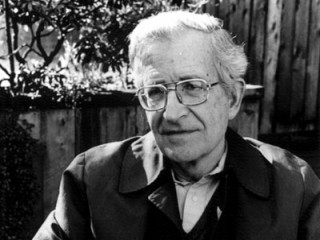
Noam Chomsky biography
Date of birth : 1928-12-07
Date of death : -
Birthplace : Philadelphia, Pennsylvania, United States
Nationality : American
Category : Famous Figures
Last modified : 2011-07-15
Credited as : Linguist, scientist, political activist
0 votes so far
Noam Chomsky is credited with revolutionizing the field of linguistics by introducing the Chomsky hierarchy, which partitions formal grammars into classes with increasing power; generative grammar, a form of syntactic analysis; and the concept of a universal grammar which underlies all human speech and is based in the innate structure of the brain. His early criticisms of the Skinnerian theories of mind, and his refutations thereof based on linguistic research, profoundly undermined behaviorist psychology and spurred tremendous advancements in the area of cognitive research. Meanwhile Chomsky's work on formal languages (as used in mathematics and logic) and on the acquisition and processing of language has greatly affected such additional fields as artificial intelligence research, computerized language translation, evolutionary psychology, and even immunology.
Avram Noam Chomsky was born 7 December 1928 in Philadelphia, Pennsylvania. In 1955 Chomsky earned his Ph.D from the University of Pennsylvania, where he had studied linguistics and philosophy under the tutelage of Zellig Harris. After graduation he joined the staff of the Massachusetts Institute of Technology, where he would remain for some 19 years, teaching in the department for Modern Languages and Linguistics (later the Department of Linguistics and Philosophy).
Additionally, from 1958 to 1959, Chomsky was in residence at Princeton's Institute for Advanced Study and in the spring of 1969 he delivered the John Locke Lectures at Oxford. Other significant lecture positions have included the Bertrand Russell Memorial Lecture at Cambridge University (1970), the Nehru Memorial Lecture in New Delhi (1972), and the Huizinga Lecture in Leiden (1977). From 1966 to 1976 he held the Ferrari P. Ward Professorship of Modern Languages and Linguistics. He held a Guggenheim fellowship from 1971-72.
Noam Chomsky is a recipient of the Distinguished Scientific Contribution Award of the American Psychological Association, the Kyoto Prize in Basic Sciences, the Helmholtz Medal, the Dorothy Eldridge Peacemaker Award, the Ben Franklin Medal in Computer and Cognitive Science, numerous honorary fellowships and degrees and many other honors. His significant published works in the field of linguistics include Current Issues in Linguistic Theory (1964), The Sound Pattern of English (with Morris Halle, 1968), Language and Mind (1972), Studies on Semantics in Generative Grammar (1972), The Logical Structure of Linguistic Theory (1975), and Knowledge of Language (1986).
In the late 60s Chomsky became involved in anti-war activism, eventually publishing a collection of essays on the U.S. involvement in Vietnam (American Power and the New Mandarins, 1969). He was accused of defending the genocidal regime of the Khmer Rouge (led by Pol Pot) when he published a critique condemning U.S. press coverage villifying "official" enemy Cambodia while ignoring the equally serious crimes of dictatorships friendly to U.S. interests. Chomsky has since become a profoundly influential voice among left wing academics, lecturing widely and publishing numerous books on U.S. foreign policy, Mideast politics, and related subjects. While his political critics have classified him as "anti-American" and at times even "anti-Zionist", Chomsky describes himself as a libertarian socialist and an anarchist. That is, wherever there are power hierarchies that are harmful, he seeks to disrupt these, if only through revealing the truth (as he sees it) about their oppressive activities.
His self-professed commitment to freedom has led him to champion the free speech rights of some rather unpopular groups and individuals, including Robert Faurisson, a French professor and author who claims that the Holocaust never happened. The entire affair is somewhat muddled. Partly because of his pre-existing views on the state of Israel, and partly because he referred to views expressed in Faurisson's work as "findings", Chomsky is seen by some to be adding undue credibility to Faurrison's research. Chomsky wrote text that was used as the forward to Faurisson's book, Mémoire en Défense. Chomsky claims a general unfamiliarity with the works of Faurisson, though he signed a petition supporting Faurisson's right to free speech and authored an essay regarding the matter. One particularly damning statement from Chomsky that is often used against him: "I see no anti-Semitic implication in the denial of the existence in gas chambers or even in the denial of the Holocaust". Chomsky later explained that ignorance, as well as anti-Semitism, can lead to such views.
In any event, many of Chomsky's (other) political views and activities have made him a popular figure with such like-minded artists and musicians as Pearl Jam, U2, and Rage Against the Machine, and Rolling Stone magazine described him as "one of the most respected and influential intellectuals in the world". The Chicago Tribune reports that Chomsky is "the most often cited living author". In fact, among intellectual icons -- living or dead -- Chomsky places eighth, just behind Plato and Sigmund Freud in frequency of reference.
















